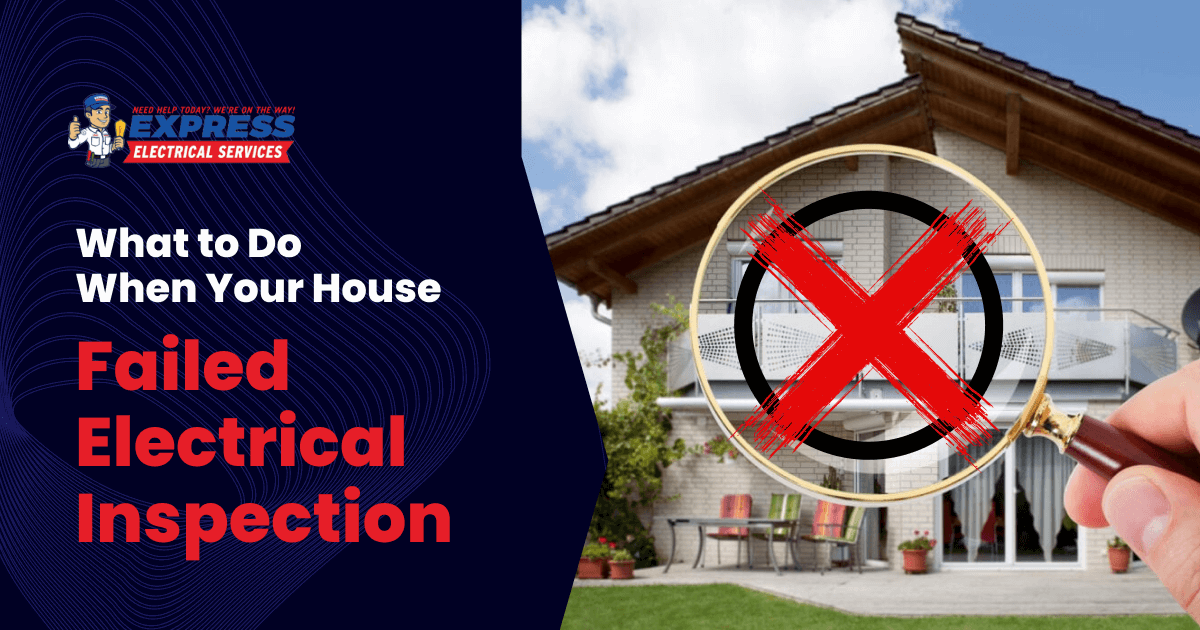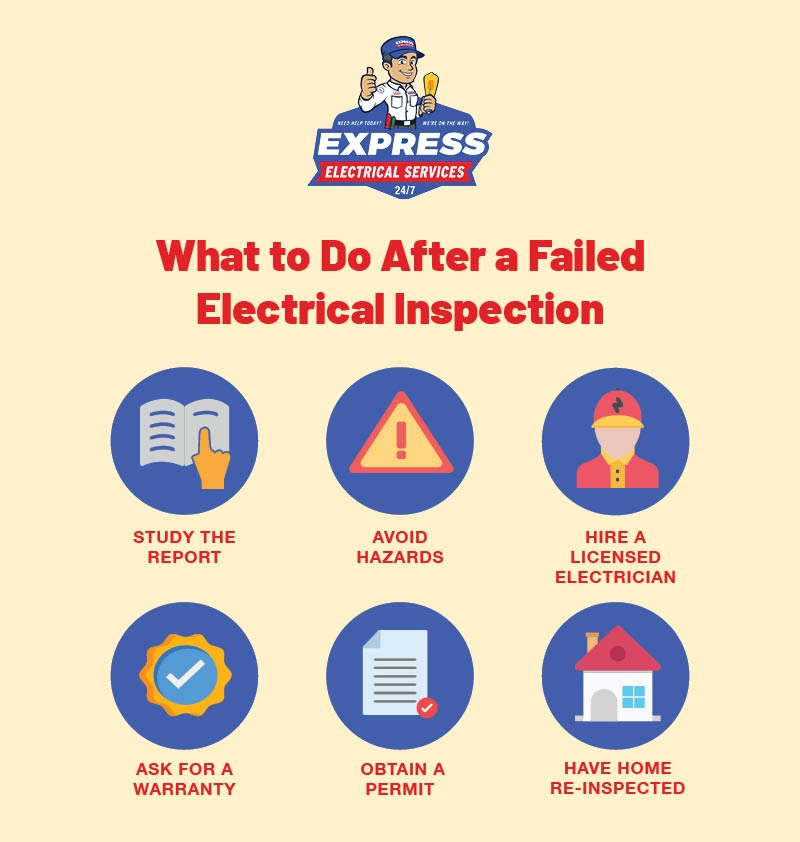What to Do When Your House Failed Electrical Inspection

Electrical inspections are essential for keeping your home safe and functional. Home electrical inspection failures can be frustrating and concerning for homeowners, but understanding the factors involved in a failed inspection can help ensure the safety and compliance of your home.
Learn why your home failed its electrical inspection and how Express Electrical’s expert team can help get your home up to standard.
Why Did My House Fail the Electrical Inspection?
Under federal and state regulations, electrical wiring, new fixtures or upgrade installations, or plans to buy or sell a home require electrical inspections. Professional inspections ensure your home complies with the National Electric Code or local California codes.
During the inspection, your inspector will look at your wiring, outlets, switches, appliances, overall systems, and other details on their electrical inspection checklist. Following their inspection, they’ll provide you with a detailed report on their findings with information about necessary corrective actions or things to monitor. It typically includes a description and explanation of electrical code violations with citations to the specific code sections. In some cases, the report may include photos to illustrate and clarify violations.
If your home failed an electrical inspection, the inspector may have found some of these common electrical code violations:
- Faulty wiring: Bad connections, exposed wiring, or any deviation from correct installation standards can result in an inspection failure. Outdated knob and tube or aluminum wiring can also fail an inspection.
- Improper grounding: Electrical systems must have proper grounding to prevent electrical shocks and fires. Three-prong outlets have a hole where the ground wire attaches — outlets with just two holes likely don’t have proper grounding.
- Overloaded circuits: Too many electrical devices or appliances on a single circuit can overload its capacity, leading to tripped breakers, overheating, and fire hazards.
- Inadequate GFCI and AFCI protection: Ground fault circuit interrupters (GFCIs) protect your home from electrical shocks in areas prone to water and moisture. Arc fault interrupters (AFCIs) detect arcing that can lead to electrical fires. The absence of either of these devices can result in an instant inspection failure.
- Unsafe electrical panels: Improperly installed or upgraded electrical panels with issues like overcrowded wiring or inadequate clearance around the panel are common causes of inspection failures. Corrosion, rust, missing panel covers, and other damage to electrical panels can also pose significant risk and fail an inspection.
Understanding Your Home Electrical Inspection Failure Report
Your electrical inspection report helps to highlight your system’s issues and serves as a guide to addressing electrical problems. Understanding the details of your electrical report is essential for ensuring your home’s compliance with safety standards and electrical codes.
The inspection report should clearly outline each issue, ranging from minor infractions to serious violations requiring immediate attention. If the inspection uncovers exposed wiring, for example, it’ll cite the corresponding code section and clarify the required correction to meet safety and compliance standards.
Understanding these code references helps you communicate with your electrician and ensure their repairs or installations meet electrical code standards. Electrical codes also update regularly to reflect electrical safety and technology advancements, so addressing code violations helps future-proof your home against evolving safety requirements.
Consequences of Not Fixing Electrical Problems
Neglecting electrical problems in your home can lead to more than a failed electrical inspection. Electrical codes exist to protect individuals from faulty systems, and putting off repairs can lead to:
- Safety risk: Electrical hazards increase the risk of surges, arcing, shocks, and electrical fires, which can have serious consequences for your household.
- Repair costs: Neglecting electrical problems allows them to develop into bigger problems. Minor inconveniences can escalate into major problems that require more involved and expensive repairs.
- High energy consumption: An improperly installed or damaged system can lead to inefficiencies, therefore increasing energy consumption and energy bills.
- Insurance problems: Some insurance policies refuse or void coverage for homes with electrical safety hazards discovered in a failed inspection, leaving you financially responsible in case of an electrical accident.
- Legal issues: Incompliance with standards and codes can result in fines and legal liability.
What to Do After a Failed Electrical Inspection

A failed inspection provides you with all the problem areas in your electrical system, so the next move involves arranging necessary repairs ahead of re-inspection. Broken down, this process includes several steps:
1. Study the report
The electrical report will describe the problems requiring immediate attention. You can use this information to find the right electrician and request estimates on repair and installation costs.
2. Avoid hazards
Avoid using wiring, circuits, panels, or other hazards cited in the report until repairs are complete and your home passes inspection. If you’re moving into a new home that doesn’t meet the current electrical code, wait before occupying the space. If possible, keep the power off as most code violations pertain to fire hazards.
3. Hire a licensed electrician
Your electrician should have the training and experience to perform electrical repair and additional inspection. Check that your electrician is licensed, insured, and bonded. Hiring a professional electrician is an investment that allows you to efficiently and safely resolve problems with your electrical system, therefore avoiding repeated inspections, fines, or other inconveniences. Licensed electrical technicians should be familiar with industry regulations and what inspectors look for.
Based on the inspection report and your electrician’s evaluation, create a repair plan and timeline. Prioritize repairs based on safety and compliance requirements to minimize hazards. Your electrician can also assist with planning for repairs.
4. Ask for a warranty
Have your repair work warrantied if possible. If your electrician warranties their work, it can cover the cost of repairs in case their repairs fail the inspection
5. Obtain a permit
Many areas require a certified contractor to apply for an electrical permit for various electrical installations and repairs. Minor fixes may not need a permit, but reconfiguring or repairing major parts of your system generally requires a permit.
6. Have your home re-inspected
Once a qualified electrician corrects the issues identified in the inspection report, you usually have 24 hours to schedule a re-inspection. The inspector will confirm the problem is resolved, assess the repair techniques, and evaluate the quality of the components and products used.
Re-inspection and Beyond
Prepare for the re-inspection by keeping organized records of invoices, permits, and other documents relating to your electrical system repairs. Have the original inspection report handy for the second inspection. If your electrical system’s repairs pass the inspection, the inspector confirms compliance with electrical codes and presents you with a certificate of approval.
Schedule Code-Compliant Electrical Work with Express Electrical Services
From fixing electrical code violations to upgrading your system, you can trust Express Electrical Services to get the job done properly.
With a range of electrical services, guaranteed 100% satisfaction, and other advantages, Express Electrical’s team is the go-to provider for Southern California residents. Representatives are available 24/7 to take your call — contact us or book online to get started.
Frequently Asked Questions
Can a failed electrical inspection affect the sale of my home?
Homes must typically pass electrical inspections before finalizing the sale. A failure can delay the sale, complicate insurance applications, cause buyer concerns, and marketability problems.
Can I do any of the repairs myself, or do I need to hire a professional?
Many jurisdictions only permit licensed electricians to complete certain electrical installations or repairs. Electrical work can also be hazardous and complicated without the correct training, and attempting to DIY repairs instead of hiring an electrician can result in delayed approval.

Leave A Comment